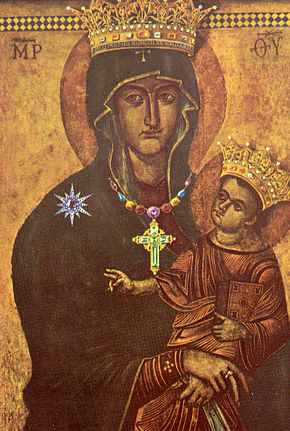Salus Populi Romani
| Salus Populi Romani Protectress and Health of the Roman People |
|
|---|---|

The bejewelled image suspended on the high altar
|
|
| Location | Basilica of Saint Mary Major |
| Date | 590 AD (first arrival in Rome) |
| Witness | Pope Gregory the Great |
| Holy See approval |
Pope Gregory XVI Pope Pius XII |
| Shrine | Basilica of Saint Mary Major |
Salus Populi Romani (Protectress, or more literally health or salvation, of the Roman People) is a Roman Catholic title associated with the venerated image of the Blessed Virgin Mary in Rome. This Byzantine icon of the Madonna and Christ Child holding a Gospel book and is enshrined within the Borghese (Pauline) Chapel of the Basilica of Saint Mary Major.
The image arrived in Rome in the year 590 AD during the reign of Pope Gregory I. Pope Gregory XVI granted the image a Canonical Coronation on 15 August 1838 through the Papal bull Cælestis Regina. The venerated image regained its longstanding devotion and status by being crowned again for the second time by Pope Pius XII on the Feast of the Queenship of Mary on 11 October 1954 accompanied by his Papal bull Ad Reginam Caeli. Recent papal devotion includes Pope John Paul II who highlighted its iconography during the World Youth Day for the Jubilee Year of 2000. Pope Benedict XVI also venerated the image on various occasions with that specific Marian title.Pope Francis also made this icon one of his first places of pilgrimage the day after his election to the Papacy.
The phrase Salus Populi Romani goes back to the legal system and pagan rituals of the ancient Roman Republic. After the legalisation of Christianity by Emperor Constantine the Great through the Edict of Milan in 313 AD, the phrase was sanctioned as a Marian title for the Blessed Virgin Mary.
...
Wikipedia
